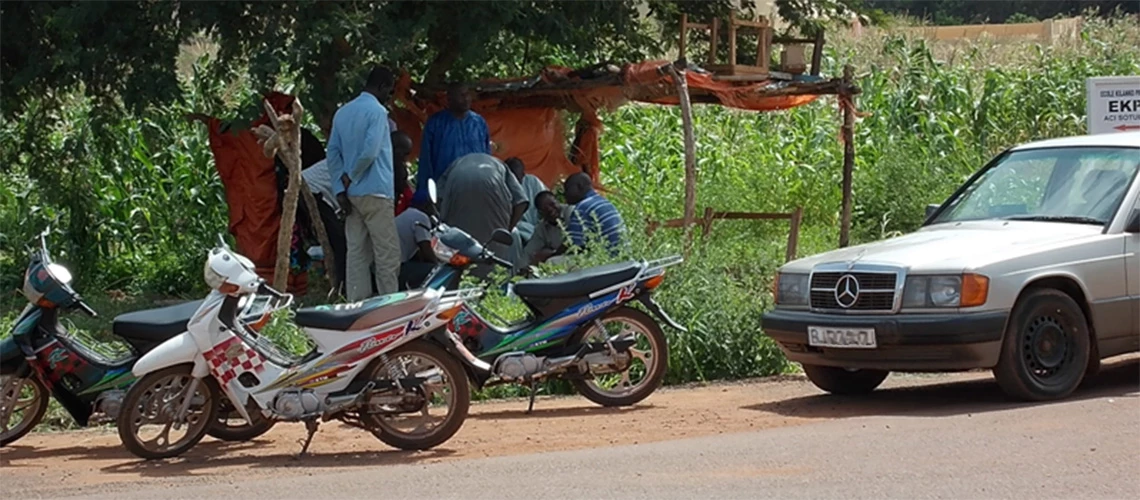 Trading land in Bamako, Mali (2012). | © Harris Selod / World Bank
Trading land in Bamako, Mali (2012). | © Harris Selod / World Bank
In West African cities, finding land for housing in the informal peri-urban land markets can be a challenging and risky endeavor. Property rights are often absent, leading to disputes due to contested sales or multiple sales of the same plot. Our new research explores the role of ethnic kinship in land markets in West African cities: How does ethnic kinship affect transactions and perceptions of tenure risk? What is the potential for traditional institutions of ethnic kinship to mitigate risks in informal land transactions?
In Mali and other West African countries, ethnic kinship links are a key feature of society. These links, known in Mali as Sinankuya, were established in the 13th century and involve extended "cousinage" between members of different ethnic groups. They manifest in ritualized mocking, whereby people meeting for the first time engage in trivial jokes and trade humorous insults about their ancestors. This institution of “cousinage” (also referred to as “joking relationships”) helps identify mutual obligations and is believed to promote social cohesion in West African societies.
Our study investigates the extent to which Sinankuya applies to urban and peri-urban land markets in Bamako and whether it can help ensure safer transactions in a context of generalized land tenure insecurity. For this, we conducted a survey administered to over a thousand individuals in Bamako and its surroundings, presenting them with fictive scenarios of land purchase to assess the role of cousinage in land markets.
The survey results revealed that respondents significantly preferred to purchase informal land from ethnic cousins as they believed that plots sold by them would be more secure. As shown by Figure 1, the premium in trust towards ethnic cousins only applies to plots that do not have a formal property right and can thus be insecure. If the fictive seller was an ethnic cousin, respondents were 7 percentage points less likely to perceive that the purchase of an informal plot might be risky. With on average 75 percent of respondents believing that buying an informal plot from a non-cousin is risky, this corresponds to a 9.3 percent reduction in risk perception.
Figure 1. Difference in risk perception if the fictive seller of the plot is a cousin
(in comparison with a non-cousin), for formal and informal plots.

We then asked respondents if they would try to legalize the ownership of the informal plot if they were to buy it from the fictive seller. 41 percent of respondents declared they would do so. However, the desire to formalize was lower if the plot were to be purchased from a fictive cousin—although the effect was only weakly significant. This is another indication that plots sold by ethnic cousins are deemed more secure.
When presented with fictive scenarios of selling a risky plot, respondents were more likely to choose to sell to a non-cousin buyer. Illustrating this point, Figure 2 shows that respondents were 11.3 percentage points more likely to choose to sell the fictive plot to a non-cousin and 5.2 percentage points less likely to choose to sell it to an ethnic cousin (as opposed to being indifferent to the buyer’s ethnicity). This is in line with the belief that people who do not comply with cousinage obligations (in our case by selling a contested plot to a cousin without disclosing the risk) will be either shamed or punished by society, or even struck by fate.
Figure 2. Difference in the probability to choose a cousin or a non-cousin buyer over indifference when selling a risky plot (in comparison with selling a fictive secure plot)

We embedded these mechanisms in a theoretical model of informal land transactions and land use, which allowed us to explain buyers’ assessments of risks in interpersonal transactions and sellers’ strategies to engage in such transactions. The model shows that information asymmetry between sellers (who know the intrinsic risk associated with their plot) and buyers (who do not know that risk) is attenuated by the matching along cousinage relationships of sellers and buyers who trade low risk plots. The model also shows that policies that make plots secure by subsidizing their registration in a cadastre can be more efficient in the presence of the cousinage institution. This is because of a sorting effect: As informal but relatively secure plots are sold among cousins, a registration subsidy is better targeted at owners of relatively more risky plots.
Our research highlights the importance of accounting for social structures in understanding markets, particularly in the developing world. In the case of informal land markets, we documented that transactions do not occur at arm’s length and showed that traditional institutions can play a beneficial role by reducing information asymmetry and facilitating trusted transactions. In spite of policy makers’ ongoing efforts to modernize land administrations throughout the region, such institutions will continue to play a role as long as access to formal property rights remains unaffordable to a large part of the population.
Notes: Figure 1 shows the marginal effects from a logit regression of the perceived risk associated with a purchase of an informal formal plot sold by a fictive ethnic cousin. Figure 2 shows the marginal effects from a multinomial logit regression of the probability to choose a cousin or a non-cousin buyer (as opposed to being indifferent) when selling an insecure informal plot.
To learn more about land markets in West Africa read:
Companion paper on information asymmetry regarding land tenure risks:



Join the Conversation